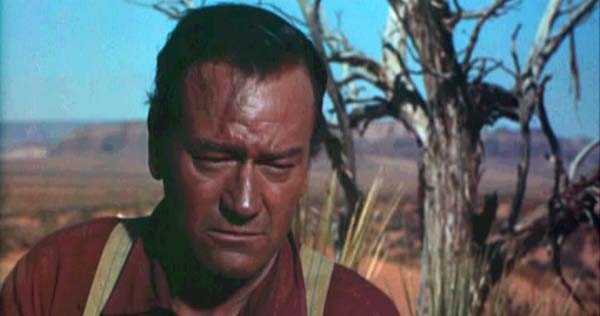
During most of my life I’ve thought of myself as a loner, an unexpected consequence of watching far too many westerns on Saturday afternoons when young. Alas, I never quite managed to become a drifter, the easygoing kind who moseys into the sunset as the credits roll. But even now I keep on my desk a silver-plated cap gun used throughout my childhood in innumerable games of Cowboys and Indians. The trigger still has a nice feel to it—I’ve just fired off a couple of quick shots, which I sometimes do when frustrated by a piece of writing. No caps, though. They would frighten Cinnamon, the wonder cat of Silver Spring, Maryland.
For good or ill, my ideal of masculine comportment derives from movies and TV shows about strangers who ride into town, don’t say much about themselves, and inevitably turn out to be the fastest guns alive. Indeed, I remember an old Glenn Ford film with just that title: The Fastest Gun Alive. If I recall correctly, at one point somebody extends his arm and drops a silver dollar. Before it hits the ground, Glenn has drawn his sidearm and put a bullet hole smack in the center of the coin.
Despite many years in which I secretly imagined myself as James Coburn in The Magnificent Seven or Clint Eastwood in A Fistful of Dollars, I’ve recently come to recognize that I’ve been living a lie. How can you think of yourself as a black-garbed “knight without armor in a savage land,” as Richard Boone was called in Have Gun, Will Travel, if, in fact, you belong to a dozen social organizations and dining clubs? How frou-frou is that?
What’s more, I’m a proud member of all of them. There’s the Baker Street Irregulars, the nearly 80-year-old literary organization devoted to honoring Mr. Sherlock Holmes. Then there’s Eta Sigma Phi, the national classical organization. My name appears on the rosters of the North American Jules Verne Society, The Ghost Story Society, and the Lewis Carroll Society. After giving a talk last year at the Nebula Awards, I was tickled to be made an honorary member of the Science Fiction Writers of America. I attend, all too infrequently, meetings of Capital! Capital!, the local chapter of The P. G. Wodehouse Society. And just this spring I joined the Mystery Writers of America. Twenty-five years ago I even belonged to the exclusive Arthur Inman Society. Inman was a notorious recluse, who kept a voluminous diary, eventually edited by Daniel Aaron into two extremely thick volumes. The club comprised people, then living in Washington, who had actually read the diary. There was no other requirement. Besides me, the group included my late (and much-missed) Washington Post colleague Reid Beddow, the longtime New Yorker editor Jeffrey Frank, and the Bangkok Post columnist Bob Halliday.
As it happens, I also helped establish an even more chi-chi group: the Dawn Powell Society of Washington. It was founded in a bar when four journalists—all winners of a prize that starts with P—were sitting around drinking too much and talking about their shared admiration for the novelist Dawn Powell. I happened to have a copy of Powell’s diaries with me, so on its endpapers I scribbled out the name of the organization, along with its board of directors. Then music critic Tim Page, novelist Lorraine Adams, New Yorker writer Kate Boo, and I all signed it. The DPSW, its members now long dispersed, has never met again.
But The League of Extraordinary Gentlemen is, happily, still going strong. This organization, it should be explained, facetiously adopted its grandiose name from Alan Moore’s graphic novel, though such a self-designation isn’t inappropriate. The League’s membership remains top secret, in part because it exercises immense power in our nation’s capital, albeit sub rosa, from the wings or behind the curtain. The current Gentlemen include two leading scientists for the Secret Service (one an expert on documents, the other on fingerprints), arguably the country’s foremost forensic anthropologist, an authority on early cinema, a professor of classics, a distinguished science journalist, the director of African Studies at a major university, a freelance editor, a guy who has read every one of the 100 best books in the Western canon (not I), a leading scholar of the English Romantics, and our chief, the master of those who know or need to know—a former New Orleans private eye, now universally esteemed for his authorship of the standard guide to library research. Just as the Baker Street Irregulars reveres Sherlock, so the League pays homage to his smarter brother, Mycroft Holmes, who sometimes “is the British government.”
Enough. I fear that all this talk of exclusive clubs and sodalities must sound elitist as all get out or at least a bit weird. But let me add that there’s one outstanding organization I don’t belong to: Phi Beta Kappa. My first two years of college were—shall we say?—checkered. Still, I’ve always fancied owning a waistcoat from which one of those little keys would dangle on a thin gold chain. When people noticed me casually twirling it about, I would say, “This? Oh, it’s just my Phi Beta Kappa key. Got it as a sophomore, don’t you know? Something about mine being a special case. It was back about the time I won that chess championship and was elected president of Mensa …”
Hmm. I think I’d better stick with the cowboy fantasy. The Hash Knife gang has been getting out of hand lately, threatening those sheep-herders, the old marshal’s taken to drink, and the good townfolk need serious help. Picture the pretty schoolmarm or the feisty dance hall girl—I can go either way on this—as she hurries to the telegraph office. In her gloved hand is a business card, and you can just make out a few words: Wire Paladin, Silver Spring, Maryland.

